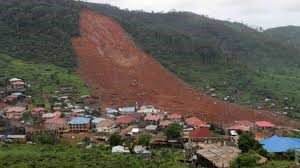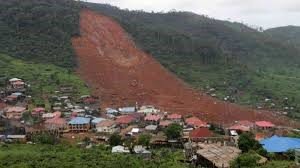By Mohamed Ismail Kamara Netherlands
Beneath the dwindling canopy of its once-thriving forests, Freetown teeters on the brink of an environmental disaster. This article, exposes the alarming devastation wrought by unchecked deforestation in Sierra Leone’s capital a crisis demanding urgent intervention.

The Crisis Unfolding
Freetown, a city cradled by the Western Area Peninsula Forest Reserve, faces an existential threat as rampant deforestation strips away its natural defenses. Once a biodiverse sanctuary spanning over 130,000 hectares, the reserve has lost approximately 26% of its forest cover since 2016, according to a recent United Nations report. The culprits? Illegal logging, urban encroachment, land grabbing, and destructive practices like charcoal burning and quarrying.
The consequences are no longer theoretical. Freetown now grapples with relentless flooding, deadly landslides, extreme heat, and erratic winds all symptoms of a destabilized ecosystem. Each rainfall washes torrents of eroded soil into the city’s streets and the Atlantic Ocean, a visceral warning of the looming calamity.
The Science of Collapse
Forests are not merely scenic backdrops; they are lifelines. Trees anchor soil to bedrock, preventing landslides. They regulate water cycles, replenish watersheds, and absorb carbon dioxide. Their destruction has triggered a vicious cycle. Topsoil Erosion: Bare hillsides crumble, accelerating sediment buildup in waterways and worsening floods. Water Scarcity: The reserve supplies Freetown’s freshwater. Deforestation disrupts this lifeline, threatening households and so on. Biodiversity Loss: Unique species vanish, destabilizing ecosystems that once supported food security and disease resistance. Climate Acceleration: With fewer trees to sequester carbon, Freetown faces hotter temperatures and more extreme weather.
As Sarah Tancredi noted in Sigma Earth, human activity is the undeniable driver of this crisis. Yet, political inertia and weak enforcement have allowed the destruction to persist.
A Dire Forecast
The UN’s findings are a wake-up call: without intervention, Freetown faces a wide spectrum of climate-related threats, including deforestation, sea-level rise, coastal erosion, flooding, and landslides, all of which compound the city’s vulnerability. These risks mirror past tragedies such as the 2017 mudslide that claimed hundreds of lives. The World Bank described that event as “a man-made disaster,” driven by rapid urbanization, poor urban planning, and deforestation even within once protected forest reserves.
The collapse of the iconic Cotton Tree was not merely symbolic; it was a harbinger of what lies ahead. Recent floods and the widespread destruction of homes and properties across the city serve as further warnings of an impending catastrophe. I do not wish to sound pessimistic or alarmist, but the reality is undeniable: without decisive action, our beloved city will one day fall. The question is no longer if disaster will strike, but when.
The Path to Redemption
Freetown’s survival hinges on immediate, coordinated action:
- Reforestation at Scale: Launch a city-wide campaign to replant native trees, prioritizing the Western Area Peninsula Forest Reserve. Partner with NGOs and communities to ensure sustainability.
- Halt Deforestation Now: Ban illegal logging and timber exports outright. Demolish illegal structures in protected zones, regardless of political influence.
- Policy Overhaul: Strengthen environmental laws and penalize violators. Establish independent oversight to curb corruption.
- Community Mobilization: Educate citizens on forest stewardship. Empower local leaders to monitor and protect their ecosystems.
- Corporate Accountability: Regulate industries like quarrying and marijuana farming, mandating ecological restoration.
This is not pessimism; it is a prognosis grounded in evidence. Freetown’s leadership must move beyond symbolic gestures and commit to implementing the solutions already outlined in the UN’s climate and environmental resilience findings [UN, 2023]. Protecting ecosystems remains central: when nature is safeguarded, it in turn safeguards communities.
Let the floods, landslides, and fallen Cotton Tree be our final warning. The hour is late, but not too late if we act now. While the challenges are severe, decisive intervention can still alter the city’s trajectory. The window for action is narrow, but it remains open.




